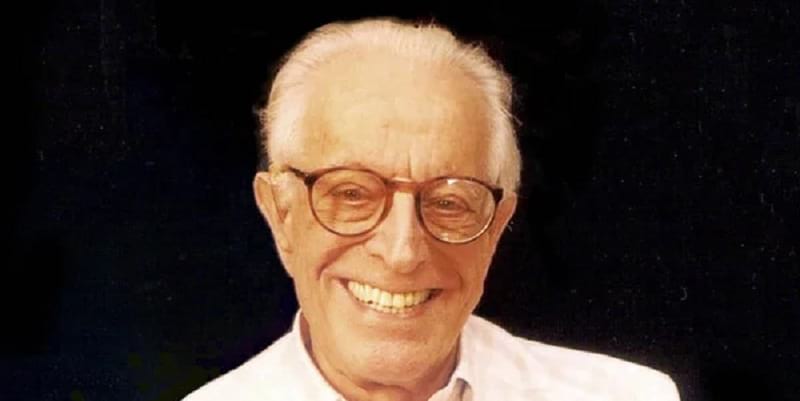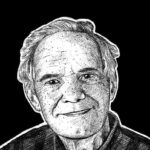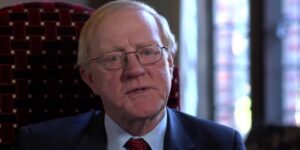Albert Ellis biografie en boeken

Albert Ellis (27 september 1913- 24 juli 2007) was een Amerikaans psycholoog en de ontwikkelaar van de rationele emotieve gedragstherapie, die de basis werd voor de hedendaagse cognitieve gedragstherapie. Albert Ellis geldt als een van de meest invloedrijke en succesvolle psychologen na Carl Rogers en Sigmund Freud. Psychology Today stelt zelfs dat er geen enkel ander individu zoveel invloed heeft gehad op de moderne psychotherapie als Ellis. Ook Freud niet.
Biografie Albert Ellis
Jeugdige jaren
Albert Ellis werd geboren als een van drie kinderen van een joods gezin in Pittsburgh, Pennsylvania. Het gezin groeide op in de wijk The Bronx, in New York City. Zijn moeder Hattie leed naar eigen zeggen aan een bipolaire stoornis en zijn vader Harry toonde weinig genegenheid richting zijn kinderen. Harry was een makelaar die vaak op reis was en zeer sporadisch zijn kinderen zag.
De ouders van Ellis scheidden toen hij zich in zijn tienerjaren bevond.
Ellis leed aan verschillende gezondheidsklachten als kind. In een periode van 2 jaar werd hij acht keer opgenomen in het ziekenhuis. De langste opname in het ziekenhuis duurde bijna een jaar. Ellis verklaarde later dat hij leerde omgaan met het gebrek aan medeleven van zijn ouders door een grote mate van onverschilligheid te ontwikkelen.
Tijdens de Grote Depressie probeerden alle kinderen in het huishouden Ellis zo goed als kon hun ouders te helpen door te werken. Ondanks dat de ouders ver van hun kinderen stonden op emotioneel gebied, hadden ze de kracht om door te werken en tegelijkertijd hun school af te ronden. In 1934 behaalde Ellis zijn Bachelor of Arts in Business aan het City College of New York Downtown.
Nadat Ellis afstudeerde, startte hij zijn eigen bedrijf. Het initiatief bleek weinig succesvol en hij begon zich meer te richten op schrijven. Ook het schrijven verliep niet vlekkeloos en hij besloot om de klinische psychologie in te gaan.
Hij schreef zich in voor een Ph.D. traject aan het Teachers College van de Columbia University in 1942. Tegelijkertijd begon hij zijn privépraktijk en een jaar later voltooide hij zijn Master in het onderwerp. Nog voordat hij zijn doctoraat had afgerond, schreef hij verschillende artikelen en uitte hij kritiek op de traditionele persoonlijkheidstests. In 1947 rondde hij officieel zijn Ph.D. af in de klinische psychologie aan de Columbia University.
Ellis had in zijn jeugd een overdreven en irrationele angst om in het openbaar te spreken en om met vrouwen te praten. Hij dwong zichzelf om met 100 verschillende vrouwen in de botanische tuin van The Bronx te praten. Hoewel hij er geen date aan overhield, raakte hij naar eigen zeggen wel ongevoelig voor de angst voor de afwijzing van vrouwen.
Professionele leven Albert Ellis
Direct na het behalen van zijn doctoraat raakte Ellis geïnspireerd door het werk van Sigmund Freud. Hij besloot zich te verdiepen in de materie van de psychoanalytica en sloot zich aan als docent aan de New York University. Hij bekleedde daar een aantal belangrijke staffuncties.
Eind de jaren veertig begon hij te werken aan de Rationeel Emotieve Gedragstherapie. In de jaren tot 1957 hield Ellis zich voornamelijk bezig met het onderwijzen van nieuwe systemen en methoden voor de gedragstherapie aan andere therapeuten. In deze periode ontwikkelde hij ook de rationele emotieve gedragstherapie. Ook ontwikkelde hij het ABC model. Dit model wordt nog steeds gebruikt als methode voor cognitieve gedragstherapie.
Albert Ellis was nauw betrokken hij de studie van erotische relaties. Hij had een ruimdenkende houding ten opzichte van seks en publiceerde er zelfs een van zijn meest spraakmakende werken over: Sex without Guilt.
In 1959 publiceerde hij How to Live with a Neurotic. Hierin werkt Ellis de cognitieve gedragstherapie verder uit.
Hij richtte daarop The Institute for Rational Living op, ondanks de trage acceptatie van zijn methode. In 1960 presenteerde hij een artikel over zijn herziene aanpak bij de Americam Psychological Association (APA). Het instituut werd acht jaar later ingericht als opleidingsinstituut en psychologisch centrum.
Gedurende die jaren zestig werd Albert Ellis opvallend genoeg een populair figuur in de Amerikaanse seksuele revolutie. In een aantal artikelen zette hij thema’s als menselijke seksualiteit en liefde uiteen. In 1965 schreef hij een artikel over homoseksualiteit: Homosexuality: It’s Causes and Cures. Albert Ellis werd door velen beticht van homofobie, maar spreekt dit zelf tegen in uitgebreide statements.
Aan het begin van de jaren zeventig richtte hij The Living School op. Gedurende deze tijd bekleedde hij veel belangrijke functies in gespecialiseerde verenigingen, zoals de Consulting Psychology, Society fort he Scientific Study of Sexuality en de American Academy of Psychotherapists.
In 1994 herzag Albert Ellis zijn boek Reason and Emotions in Psychotherapy. In 2008 verscheen Rational Emotive Behavior Therapy: It Works for me, It Can Work for You. Daarnaast begon hij te werken aan zijn tweede autobiografische werk: All Out!: An Autobiography.
Tot aan het einde van zijn leven bleef Albert Ellis workshops geven over mentaal welzijn en psychotherapie. Hij schreef in totaal 80 boeken en 1200 artikelen. Ook bleef hij hard werken aan het einde van zijn leven. Hij zag in de jaren voor zijn dood nog tien patiënten per week. Daarvoor hielp hij ongeveer 79 patiënten per week.
Bekende quotes
- “Acceptance is not love. You love a person because he or she has lovable traits, but you accept everybody just because they’re alive and human.”
- “Because when you don’t perform remarkably well the next time, back to slobhood you will go! And even when you do perform well, you will be anxious about not doing so next time. So you had better like your fine performance—but not deify yourself for doing it.”
- “Even injustice has it’s good points. It gives me the challenge of being as happy as I can in an unfair world.”
- “For many years now I have had the quaint idea that all humans-yes, the whole six billion of them on this planet-are out of their fucking minds.”
- “For that again, is what all manner of religion essentially is: childish dependency.”
- “Freud had a gene for inefficiency, and I think I have a gene for efficiency.”
- “I hope to die in the saddle seat.”
- “I thought foolishly that Freudian psychoanalysis was deeper and more intensive than other, more directive forms of therapy, so I was trained in it and practiced it.”
- “If human emotions largely result from thinking, then one may appreciably control one’s feelings by controlling one’s thoughts – or by changing the internalized sentences, or self-talk, with which one largely created the feeling in the first place.”
- “If something is irrational, that means it won’t work. It’s usually unrealistic.”
- “If the Martians ever find out how human beings think, they’ll kill themselves laughing.”
- “If you don’t like something, change it. If you can’t change it, change your attitude.”
- “Life is indeed difficult, partly because of the real difficulties we must overcome in order to survive, and partly because of our own innate desire to always do better, to overcome new challenges, to self-actualize. Happiness is experienced largely in striving towards a goal, not in having attained things, because our nature is always to want to go on to the next endeavor.”
- “Men are not disturbed by things, but by the views which they take of them.”
- “Much of what we call emotion is nothing more or less than a certain kind – a biased, prejudiced, or strongly evaluative kind – of thought.”
- “People don’t just get upset. They contribute to their upsetness.”
- “People got insights into what was bothering them, but they hardly did a damn thing to change.”
- “People have motives and thoughts of which they are unaware.”
- “Rational beliefs bring us closer to getting good results in the real world.”
- “Self-esteem is the greatest sickness known to man or woman because it’s conditional.”
- “Spirit and soul is horseshit of the worst sort. Obviously there are no fairies, no Santa Clauses, no spirits. What there is, is human goals and purposes as noted by sane existentialists. But a lot of transcendentalists are utter screwballs.”
- “Stop shoulding on yourself.”
- “The art of love is largely the art of persistence.”
- “The best years of your life are the ones in which you decide your problems are your own. You do not blame them on your mother, the ecology, or the president. You realize that you control your own destiny.”
- “The best years of your life are the ones in which you decide your problems are your own. You do not blame them on your mother, ecology, or the president. You realize that you control your own destiny.”
- “The concept of deservingness for one’s “sins” implies that certain acts are unquestionably under all conditions “sinful.” And this is impossible to prove.”
- “The emotionally mature individual should completely accept the fact that we live in a world of probability and chance, where there are not, nor probably ever will be, any absolute certainties, and should realize that it is not at all horrible, indeed—such a probabilistic, uncertain world.”
- “There are three musts that hold us back: I must do well. You must treat me well . And the world must be easy.”
- “Too many people are unaware that it is not outer events or circumstances that will create happiness; rather, it is our perception of events and of ourselves that will create, or uncreate, positive emotions.”
- “You mainly make yourself needlessly and neurotically miserable by strongly holding absolutist irrational Beliefs (iBs), especially by rigidly believing unconditional shoulds, oughts, and musts.”
Bekende publicaties en boeken van Albert Ellis
- 2010. The myth of self-esteem: How rational emotive behavior therapy can change your life forever. Prometheus books.
- 2010. Rational emotive behavior therapy: It works for me-it can work for you. Prometheus Books.
- 2009. The road to tolerance: The philosophy of rational emotive behavior therapy. Prometheus Books.
- 2008. Personality theories: Critical perspectives. Sage.
- 2006. Rational emotive behavioral approaches to childhood disorders: Theory, practice and research. Springer Science & Business Media.
- 2004. Why rational emotive behavior therapy is the most comprehensive and effective form of behavior therapy. Journal of Rational-Emotive & Cognitive-Behavior Therapy, 22(2), 85.
- 2003. Early theories and practices of rational emotive behavior therapy and how they have been augmented and revised during the last three decades. Journal of rational-emotive & cognitive-behavior therapy, 21(3-4), 219.
- 2003. Cognitive restructuring of the disputing of irrational beliefs. Cognitive behavior therapy: Applying empirically supported techniques in your practice, 79-83.
- 2002. Overcoming resistance: A rational emotive behavior therapy integrated approach. Springer Publishing Company.
- 2002. The role of irrational beliefs in perfectionism.
- 2001. Rational emotive therapy (pp. 295-348). Guilford, New York.
- 2001. Feeling better, getting better, staying better: Profound self-help therapy for your emotions. Impact Publishers.
- 2001. Counseling and psychotherapy with religious persons: A rational emotive behavior therapy approach. Routledge.
- 2000. Can rational emotive behavior therapy (REBT) be effectively used with people who have devout beliefs in God and religion?. Professional Psychology: Research and Practice, 31(1), 29.
- 1999. How to make yourself happy and remarkably less disturbable. Impact Publishers.
- 1999. Why rational-emotive therapy to rational emotive behavior therapy?. Psychotherapy: Theory, Research, Practice, Training, 36(2), 154.
- 1998. The Albert Ellis reader: A guide to well-being using rational emotive behavior therapy. Citadel Press.
- 1998. Rational emotive behavior therapy: A therapist’s guide. Impact Publishers.
- 1998. How to control your anxiety before it controls you. Citadel Press.
- 1998. How to control your anger before it controls you. Citadel Press.
- 1995. Changing rational-emotive therapy (RET) to rational emotive behavior therapy (REBT). Journal of Rational-Emotive & Cognitive-Behavior Therapy.
- 1994. The sport of avoiding sports and exercise: A rational emotive behavior therapy perspective. The Sport Psychologist, 8(3), 248-261.
- 1993. The advantages and disadvantages of self-help therapy materials. Professional Psychology: Research and Practice, 24(3), 335.
- 1993. Reflections on rational-emotive therapy. Journal of consulting and clinical psychology, 61(2), 199-201.
- 1992. Group rational-emotive and cognitive-behavioral therapy. International journal of group psychotherapy, 42(1), 63-80.
- 1991. The revised ABC’s of rational-emotive therapy (RET). Journal of rational-emotive and cognitive-behavior therapy, 9(3), 139-172.
- 1990. Self-propulsion of asymmetrically vibrating bubbles. Journal of Fluid Mechanics, 212, 65-80.
- 1989. Why some therapies don’t work: The dangers of transpersonal psychology. Prometheus Books.
- 1989. Rational-emotive couples therapy. Pergamon Press.
- 1989. Rational psychotherapy. TACD Journal, 17(1), 67-80.
- 1988. Rational-emotive therapy with alcoholics and substance abusers. Pergamon Press.
- 1987. The practice of rational-emotive therapy (RET). Springer Publishing Co.
- 1987. The impossibility of achieving consistently good mental health. American psychologist, 42(4), 364.
- 1987. A sadly neglected cognitive element in depression. Cognitive Therapy and Research, 11(1), 121-145.
- 1986. Handbook of rational-emotive therapy, Vol. 2. Springer Publishing Company.
- 1986. Rational-emotive therapy applied to relationship therapy. Journal of Rational Emotive Therapy, 4(1), 4-21.
- 1985. Clinical applications of rational-emotive therapy (pp. 1-30). New York: Plenum Press.
- 1985. What is rational-emotive therapy (RET)?. In Clinical applications of rational-emotive therapy (pp. 1-30). Springer, Boston, MA.
- 1985. Expanding the ABCs of rational-emotive therapy. In Cognition and psychotherapy (pp. 313-323). Springer, Boston, MA.
- 1980. Rational-emotive therapy and cognitive behavior therapy: Similarities and differences. Cognitive therapy and research, 4(4), 325-340.
- 1980. Psychotherapy and atheistic values: A response to AE Bergin’s” Psychotherapy and religious values.”.
- 1979. Discomfort anxiety: A new cognitive behavioral construct. Part I. Rational Living, 14(2), 3-8.
- 1977. Rational-emotive therapy: Research data that supports the clinical and personality hypotheses of RET and other modes of cognitive-behavior therapy. The Counseling Psychologist, 7(1), 2-42.
- 1977. Fun as psychotherapy. Rational living.
- 1975. The biological basis of human irrationality.
- 1974. Rational-emotive theory: Albert Ellis.
- 1973. Rational-emotive therapy (pp. 32-44). Big Sur Recordings.
- 1962. Reason and emotion in psychotherapy.
- 1961. On the mechanism of cavitation damage by nonhemispherical cavities collapsing in contact with a solid boundary.
- 1961. A guide to rational living.
- 1960. There is no place for the concept of sin in psychotherapy. Journal of counseling psychology, 7(3), 188.
- 1959. Requisite conditions for basic personality change. Journal of Consulting Psychology, 23(6), 538.
- 1958. Sex without guilt.
- 1957. Rational psychotherapy and individual psychology. Journal of individual psychology, 13(1), 38.
- 1957. Outcome of employing three techniques of psychotherapy. Journal of Clinical Psychology.
- 1957. How to live with a neurotic.
- 1956. The psychology of sex offenders.
- 1955. New approaches to psychotherapy techniques. Journal of Clinical Psychology.
- 1954. The American sexual tragedy.
- 1946. The validity of personality questionnaires. Psychological Bulletin, 43(5), 385.
Citatie voor dit artikel:
Janse, B. (2022). Albert Ellis. Retrieved [insert date] from Toolshero: https://www.toolshero.nl/bekende-auteurs/albert-ellis/
Gepubliceerd op: 29/08/2022 | Laatste update: 24/03/2023
Wilt u linken naar dit artikel, dat kan!
<a href=”https://www.toolshero.nl/bekende-auteurs/albert-ellis/”>Toolshero: Albert Ellis</a>












